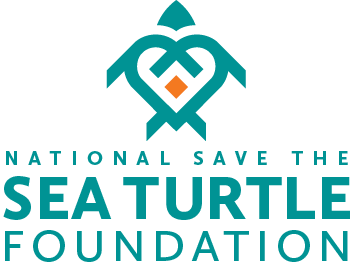Florida International University Leads in Global Sea Turtle Conservation
Angela Nicoletti,
College of Arts, Sciences, and Education
Florida International University
College of Arts, Sciences, and Education
Florida International University
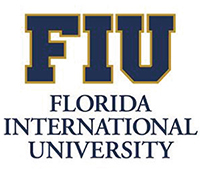
Sea turtle populations are in decline. Pollution, sea level rise, development, habitat encroachment, overfishing and illegal harvesting have decimated the number of turtles around the globe. FIU is committed to protecting sea turtles and restoring their habitats. Dr. Mike Heithaus — dean of FIU’s College of Arts, Sciences & Education — oversees the Heithaus Lab, which has been involved in sea turtle research since 1997 when initial studies began as part of the Shark Bay Ecosystem Research Project in Western Australia.
Using a combination of observational and experimental studies, FIU researchers are studying the foraging ecology, diving behavior and social interactions of sea turtles; the role sharks play in shaping turtle behavior; as well as the role of sea turtles in seagrass and coral reef ecosystems. They are working in Australia, the Caribbean Sea (French West Indies and Abaco, Bahamas), French Polynesia and Madagascar.
Uncovering the secret lives of sea turtles
Sea turtles are difficult to observe in their natural habitat because they spend so much of their time underwater. Understanding their diet, movements and behavior is critical when it comes to managing and conserving populations. In the past, researchers would have to examine the stomach contents of dead or stranded turtles to understand more about these animals. Now, FIU researchers are deploying new technology that takes scientists along for a ride on the back of a sea turtle. Using GoPro video cameras attached to the turtles’ shells, FIU scientists are gathering detailed data on turtle diving, foraging, and social behavior. “The nice thing about using video cameras in the study was to be able to directly see what animals were doing and not having to make guesses based on other information like how long they spent underwater between each time they came up for air,” Heithaus said.
In Shark Bay, Australia a team of researchers deployed more than 120 video cameras yielding nearly 400 hours of footage. They found strong patterns in sea turtle behavior associated with seasonal water temperatures, which have long been suspected but have previously proven difficult to observe. Specifically, they found turtles are more active during the warm season, spending most of their time swimming, surfacing, exploring vast seagrass meadows, feeding and interacting with other turtles. During the cold season, the turtles’ lives slow down as they spend most of their time resting on the seabeds and rarely surfacing.
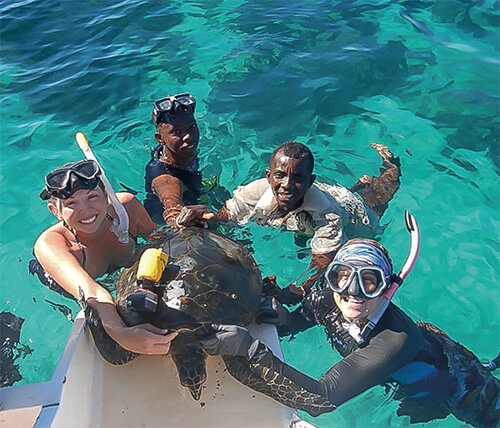
Hawksbill sea turtle research
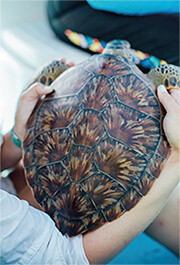
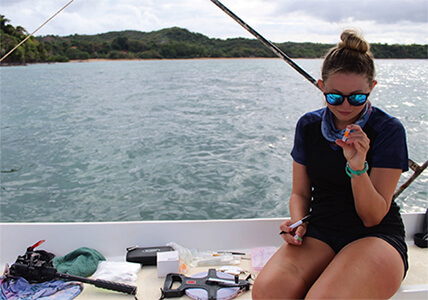
Hawksbill sea turtles are understudied relative to other species. Known to be predominantly sponge eaters, they spend their adult life on coral reefs. Previous research indicates that hawksbills have the potential to play a vital role in shaping marine ecosystems despite their small population numbers. However, the effects of turtle foraging on community dynamics between prey and habitat remain largely unclear. FIU researchers are conducting research on hawksbill foraging in Nosy Be, Madagascar using cameras attached to the turtles’ shell. The footage revealed the turtle’s comings and goings – where it went in search of food, what it ate, and whether it interacted with other turtles or marine species.
In addition, researchers are analyzing data collected from Global Finprint, an international project focused on capturing sharks and rays on camera in their natural habitats. This project has received core funding from Paul G. Allen, co-founder of Microsoft, and is part of FIU’s Tropical Conservation Institute. Global FinPrint’s data is providing desperately needed information to protect the sharks and rays, but also giving researchers a glimpse at the health of other marine populations around the globe, including sea turtle populations.
Green sea turtle research
Green turtles primarily graze on seagrass. This means they have the potential to affect seagrass communities. In Abaco, Bahamas, the Heithaus Lab has had a rare opportunity to study the non-human factors affecting a recently protected green turtle population so that management agencies can apply ecologically meaningful conservation tactics. Researchers have used unmanned aerial video, baited remote underwater video and seagrass surveys to study the foraging behavior of green turtles, including the impact of grazing on seagrass communities. The lab is also studying the effects of green turtle grazing on seagrass communities using a multi-year grazer exclusion study within four tidal creek sites along Abaco’s eastern coastline.
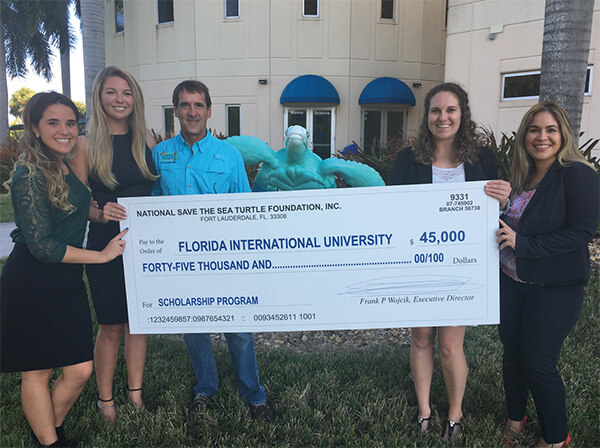
In 2014, Heithaus also co-authored a study that looked at the impacts of green sea turtles on seagrass communities in Bermuda, Australia, Indonesia and India, all locations with large green sea turtle populations. In each of the sites, data suggests seagrass meadows are being disrupted by heavy grazing where turtle populations are increasing and shark populations are down. “We’ve seen similar issues on land – the loss of wolves leads to population explosions of deer that then damage ecosystems,” Heithaus said. “We need efforts to protect and rebuild turtle populations in most of the world, but we also need to be working to ensure that populations of their predators are intact so the turtles don’t eat themselves out of house and home.”
Recently, the National Save The Sea Turtle Foundation donated $45,000 to FIU to establish a Scholarship Fund to help marine science students advance their sea turtle research. Based on academic merit and a strong commitment to studying marine science, three senior-level student applicants will be chosen receive full-year scholarships to complete their undergraduate degrees. The remainder will support research labs in FIU’s College of Arts, Sciences & Education to further the efforts of Dr. Heithaus and his students.
Helping Sea Turtles Survive for 39 Years
A NON-PROFIT ORGANIZATION
State of Florida Registration Number CH-2841 | Internal Revenue Code 501 (c) (3)
Web Design & Development by Web Expressions, LLC
